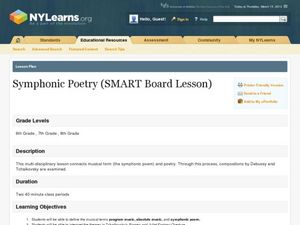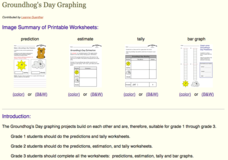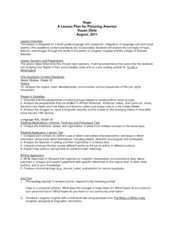Curated OER
Lesson Two: Writing Letters in Code
Combine your friendly letter instructional activity, grammar instructional activity, and technology instructional activity with this fun activity! Young writers compose letters to friends, and then convert the text to Webdings font....
Curated OER
Cat on the Mat Guided Reading Lesson
Young learners participate in a guided reading lesson. They will read the book Cat on the Mat by Brian Wildsmith. The teacher helps provide the group with reading strategies, and provides more one-on-one support during independent...
Curated OER
Symphonic Poetry (SMART Board Lesson)
Let music and poetry collide in this well-orchestrated language arts lesson plan. After studying program music and C. Debussy's Prelude to an Afternoon Faun, view the attached SMART board lesson plan to read through "Fog" by Carl...
Chicago Botanic Garden
Historical Climate Cycles
What better way to make predictions about future weather and climate patterns than with actual climate data from the past? Young climatologists analyze data from 400,000 to 10,000 years ago to determine if climate has changed over time....
Ontario
Lesson Plan for Media Literacy
Fourth graders analyze posters that communicate an "active living" message, otherwise known as a public service announcement. Children identify techniques that are used in creating media texts including topic, purpose, and...
University of Texas
Multi-wavelength Astronomy
Explore a land far, far away with a well-designed lesson that examines electromagnetic imaging as a way to obtain information about galactic structures. Learners begin to see the importance of looking beyond the visual spectrum to reveal...
Ontario
Computer Hardware —Computer Studies
What kind of components are needed for a computer? Through a differentiated lesson, individuals learn about six hardware computer components. They conduct research to determine the range of options for the components. Class members then...
Give and Let Live
Blood and Transplant: Blood
Why is blood donation so important, anyway? Science and health classes across multiple grades benefit from an in-depth look into the need for and process of blood donation. With an emphasis on presenting the topic in a non-threatening...
Baylor College
Do Plants Need Light?
Turn your classroom into a greenhouse with a lesson on plant growth. First, investigate the different parts of seeds, identifying the seed coat, cotyledon, and embryo. Then plant the seeds and watch them grow! Measure the new plants...
Baylor College
What's That Food?
Get things cooking with the first lesson in this series on the science of food. Working in small groups, young scientists make and record observations about different mystery foods. These descriptions are then shared with the class and...
Howard County Schools
Drawing Inverses
An Algebra II lesson draws the connection between the exponential function and its inverse. By graphing an exponential function and using tables and a calculator, students graph the logarithmic function. The plan comes with a launch,...
Practical Money Skills
About Credit
It's tempting to stay away from credit cards entirely, and it can also be tempting to charge large purchases on credit cards with the intention to pay them off later. But as a three-part lesson on credit and debt shows your high...
Missouri Department of Elementary
The Successful Student: What's Your Style?
Everyone is different, and they learn differently, too. After discussing what it is to be a good student, class members participate in the next instructional activity that explores their individual learning styles.
American Chemical Society
Energy Changes in Chemical Reactions
Some chemical reactions produce heat, but what is really going on? Lesson focuses on the concept of energy changes, both exothermic and endothermic. Scholars perform multiple experiments, hands-on activities, and view videos of the...
US Institute of Peace
Practicing Conflict Analysis
Does your conflict management style keep you cool and persuasive, even under pressure? Young behaviorists practice analyzing conflicts and using conflict management skills during instructional activity five in a 15-part series. The...
US Institute of Peace
Organizations Working for Peace
From helping refugees to negotiating peace treaties, the peacekeepers of the world keep busy! Introduce young activists to the many individuals and organizations throughout the world that work daily toward peace. 14th in a series of 15...
Kid Zone
Groundhog's Day Graphing
This Groundhog's Day, challenge scholars to predict, estimate, tally, and graph in a weather-themed lesson in which class members play the role of the groundhog to forecast the weather come February second.
NOAA
A Quest for Anomalies
Sometimes scientists learn more from unexpected findings than from routine analysis! Junior oceanographers dive deep to explore hydrothermal vent communities in the fourth lesson in a series of five. Scholars examine data and look for...
Curated OER
A Look at Exclusion Through Improvisation
Building a realistic understanding of the trials Jews suffered during WWII isn't always easy. This plan employs student constructed dramatic freeze frame scenes to help build a deeper understanding of Jewish Ghettos, concentration camps,...
Curated OER
Prime Factorization: Finding Factors in the Fifth Grade
The lesson starts out with a brain drain, which is a great way to get students to activate prior knowledge and build lasting connections. They tell everything they know about prime factorization, use their knowledge to...
National Endowment for the Humanities
The War in the North, 1775–1778
Using primary source documents, including maps, learners examine Revolutionary War events from 1775 to 1778. The focus here is on the challenges George Washington and the Continental army faced and how they persevered in spite of those...
Curated OER
Picturing America: Images and Words of Hope from Romare Bearden and Langston Hughes
A carefully crafted three-day lesson integrates poetry and visual art. By analyzing and comparing Langston Hughes' poem "Mother and Son" and Romare Bearden's collage "The Dove," readers explore the theme of hope. The lesson activates...
Curated OER
Writing Process- Expository Writing
Expository writing is the focus of the language arts lesson presented here. In it, young writers review what expository writing is through a class discussion and teacher demonstration. Then, learners write expository text that describes...
West Contra Costa Unified School District
Introduction to Inverse Functions
Ready to share the beauty of the inverse function with your classes? This algebra II lesson guides the discovery of an inverse function through a numerical, graphical, and an algebraic approach. Connections are made between the three,...

























